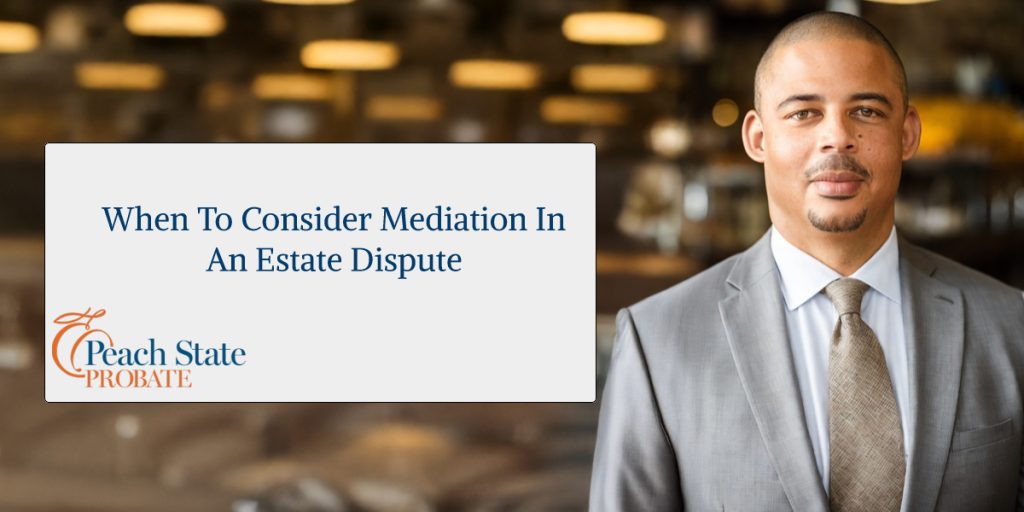## Understanding the Role of Estate Mediation in Disputes
Estate mediation serves as a pivotal process in resolving conflicts that arise during the distribution of an estate. These disputes can emerge from various circumstances, including disagreements over the validity of a will, differing interpretations of the deceased’s wishes, or conflicts among family members regarding asset division. The intent of estate mediation is to provide a structured environment where parties can communicate openly, facilitating a resolution that respects the interests of all involved.
Mediation employs a neutral third party— the mediator— who guides the conversation and helps identify common ground. Unlike litigation, where outcomes are decided by a judge, mediation relies on collaboration, allowing the parties to maintain control over the final decision. This process often results in more satisfying outcomes, as individuals feel heard and valued, thereby fostering healthier relationships post-conflict.
It is essential for parties involved in an estate dispute to consider estate mediation not only for its potential to resolve issues effectively but also for its cost-efficiency and time-saving characteristics compared to traditional court proceedings. With the rising complexity of estate matters, mediation can serve as an invaluable tool to navigate emotional and financial intricacies.
## Defining Estate Mediation
Estate mediation is a specific form of dispute resolution designed to address conflicts that arise concerning an estate. This alternative dispute resolution method involves an impartial mediator who assists individuals in negotiating and reaching a mutually agreeable solution regarding the distribution of assets. The mediator helps create an environment conducive to open dialogue, ensuring that each party feels comfortable expressing their perspectives.
The mediation process begins with the mediator establishing the rules of engagement. Individuals are encouraged to outline their concerns and positions, allowing the mediator to identify areas of commonality and divergence. Throughout the process, the mediator facilitates discussions, offers insights, and helps frame proposals to guide parties toward a resolution. Mediation can be particularly beneficial in emotionally charged estate disputes, as it emphasizes understanding and empathy.
Unlike litigation, where the parties become adversaries, estate mediation nurtures cooperation. This collaborative approach often leads to solutions better suited to the familial and financial dynamics at play. Ultimately, participants engage in a process where the outcome is designed by them, often resulting in improved relationships and reduced resentment going forward.
## The Importance of Estate Mediation
Understanding the significance of estate mediation is crucial for anyone involved in or contemplating entering an estate dispute. The increasing complexity of estates, combined with emotional dynamics within families, creates unique challenges. Mediation stands out as a practical method for managing these intricacies while fostering communication between disputing parties.
Estate mediation not only helps to solve disputes, but it also preserves family relationships. Often, family members facing these conflicts hold deep-seated emotional ties, which litigation can exacerbate, leading to long-lasting rifts. Mediation, by contrast, emphasizes understanding and compromise, encouraging parties to work together toward a common resolution that recognizes their collective interests.
Furthermore, estate mediation can save significant time and resources compared to traditional litigation. Court proceedings can drag on for months or even years, incurring substantial legal fees and emotional stress. Mediation offers a more efficient resolution process, enabling parties to move forward with their lives and address the needs of the estate in a timely manner.
## Legal Framework Surrounding Estate Mediation
Navigating the legal landscape of estate mediation requires a basic understanding of the laws and regulations that govern this process. For instance, in Georgia, mediation is often encouraged as a preliminary step before resorting to litigation. The courts recognize the benefits of mediation and frequently require parties to participate in mediation sessions to resolve their disputes amicably.
This legal groundwork allows mediators to operate within a framework that promotes equitable resolutions while protecting the rights of all involved. Estate mediation does not override any legal requirements related to wills, estates, or trusts; rather, it functions alongside these laws to offer a solution that satisfies the needs of disputing parties while adhering to legal standards.
In addition, mediation allows for a degree of confidentiality not usually available in court proceedings. Any exchanges that occur during the mediation process typically cannot be used as evidence in court if the dispute proceeds to litigation. This confidentiality encourages candor among participants, allowing them to express their true concerns and emotions freely, laying the foundation for a more amicable resolution.
## Real-World Scenarios of Estate Mediation
Real-world examples of estate mediation showcase the effectiveness of this approach in resolving disputes. One common scenario involves siblings contesting their late parent’s will, where one sibling feels the distribution favored another. In mediation, the siblings can discuss their feelings regarding the deceased’s intentions and examine any documentation that highlights those intentions, leading to a resolution that respects their shared history.
Another prevalent situation can occur when a family member feels disinherited or undervalued, often resulting in conflicting perspectives about the deceased’s wishes. Through mediation, the parties can delve into emotional undercurrents, explore the deceased’s values, and ultimately leave with a mutually acceptable and respectful arrangement that honors their loved one’s memory.
In many cases, parties who engage in estate mediation benefit from guided discussions that reinforce their familial bonds, ultimately resulting in improved dynamics post-resolution. These scenarios illustrate that through compassion and understanding, mediation can transform contentious disputes into reconciliatory outcomes.
## Initiating the Estate Mediation Process
Taking proactive steps to initiate estate mediation can significantly influence the dispute resolution process. The first step is to identify all involved parties and come together to discuss the potential for mediation. This initiative requires each participant to acknowledge that they wish to avoid court proceedings and are open to exploring a mediated resolution.
Once parties agree to mediate, selecting a qualified mediator is essential. It is advisable to choose someone with considerable experience in estate mediation, as well as knowledge of local laws and regulations governing estate-related disputes. The right mediator will help establish a safe environment for discussion while guiding the negotiation process.
The next step involves preparing for the mediation session itself. Participants should review pertinent documents such as wills, trusts, and any communication from the deceased, which may clarify the intent behind asset distributions. Furthermore, it’s important for parties to reflect on their objectives and come ready to articulate their perspectives thoughtfully; this level of preparation enhances the effectiveness of the mediation.
## Avoiding Common Mistakes in Estate Mediation
Successfully navigating estate mediation requires awareness of potential pitfalls that can derail the process. One of the most significant mistakes is failing to prepare adequately. Participants must understand that coming to mediation ill-prepared can obstruct meaningful dialogue, prolong disputes, and ultimately diminish trust between parties. Preparation involves gathering relevant documentation, understanding the issues at hand, and being clear about individual goals for the mediation.
Another common mistake is entering mediation with a rigid mindset, focusing solely on winning rather than seeking a collaborative solution. Mediation thrives on flexibility and open-mindedness. Parties should approach the process willing to explore alternative resolutions and understand that compromise is often necessary to achieve a satisfactory outcome for all involved.
Participants should also be cautious not to let emotions dictate their actions during the mediation session. While estate disputes often evoke strong feelings, allowing emotions to overpower logical discussion can hinder progress. Acknowledging emotions while remaining focused on constructive communication is vital to the success of the mediation process.
## Recognizing When to Consult an Attorney
Recognizing the appropriate time to consult an attorney during estate mediation is critical. While mediation aims to facilitate communication and resolutions without direct legal involvement, there are instances where legal guidance is necessary. If the issues at stake involve substantial assets, intricate estate plans, or concerns about a party’s legal rights, consulting an attorney beforehand can provide essential insights.
Moreover, if one party feels overwhelmed or intimidated during the mediation process, involving an attorney may help level the playing field. Attorneys can provide valuable context about someone’s rights and the implications of the agreements being made. They may also help interpret settlement terms, ensuring that parties have a comprehensive understanding of their decisions.
It’s also important to note that mediation does not preclude formal legal counsel in ongoing disputes. An attorney’s expertise can prove invaluable during negotiations, offering legal advice and ensuring that any reached agreement is fair and enforceable. Therefore, early engagement with legal counsel can enhance the effectiveness and efficiency of the mediation process.
## The Benefits of Legal Representation in Estate Mediation
Having legal representation during estate mediation can offer substantial advantages for individuals involved in disputes. An attorney can help parties navigate the complexities of estate laws, ensuring that their rights are protected throughout the process. Legal counsel can also provide clarity on the implications of various proposals and help assess the overall fairness of the mediation outcomes.
An attorney can equip parties with critical negotiation skills, guiding them on how to effectively communicate their positions while being receptive to others’ perspectives. This balanced approach can improve the likelihood of a satisfactory resolution, as parties with legal representation are often more prepared to engage in constructive dialogue.
Legal representation also brings an added layer of accountability to the mediation process. Attorneys can assist clients in drafting agreements, ensuring that the proposed solutions are not only fair but also legally binding. By working alongside an attorney, individuals can feel more confident entering negotiations, knowing their rights are safeguarded and legally sound outcomes are being pursued.
## How Peach State Probate Facilitates Estate Mediation
Peach State Probate is dedicated to assisting clients through the estate mediation process, leveraging its comprehensive understanding of Georgia’s legal landscape. The firm’s team is well-versed in structuring effective mediation sessions, ensuring that all parties can engage in open dialogue while respecting individual perspectives. They prioritize creating a supportive environment that fosters collaboration, which in turn enhances the potential for mutually agreeable solutions.
Peach State Probate takes pride in understanding the emotional complexities often associated with estate disputes. The firm’s compassionate approach acknowledges the sensitivities involved, allowing clients to navigate the mediation process with empathy and respect. This commitment to fostering a constructive environment helps lay the groundwork for positive relationships among family members post-resolution.
The firm’s extensive experience allows it to provide clients with strategic guidance throughout the process. Whether assisting in selecting a qualified mediator or helping clients articulate their goals, Peach State Probate stands by its clients every step of the way. With a track record of success in estate mediation, the firm highlights the importance of both legal knowledge and interpersonal skills in achieving effective outcomes in estate disputes.




